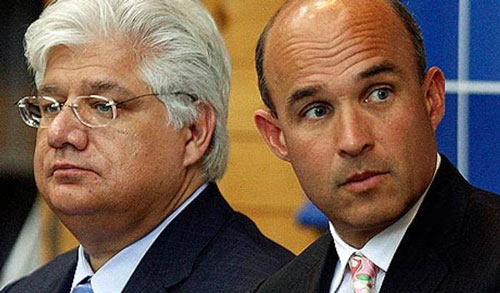
For months, Research in Motion (RIM), the Canadian maker of BlackBerry smartphones, has seemed incapable of getting anything right.
Its PlayBook tablet went on sale without e-mail (unless attached to a BlackBerry). Its network was blacked out for days with scarcely a word from the company. It has been slow to upgrade BlackBerry’s operating system. Investors squealed as the share price fell by 70% in 10 months. Canadians are now worried they might lose a second technology champion within a few years.
Ever louder calls for a change in leadership were answered on 22 January, when RIM’s joint chief executives and chairmen, Jim Balsillie and Mike Lazaridis, stepped down. Investors doubt the new chief executive, Thorsten Heins, a former chief operating officer, will stop the rot. On 23 January, the share price fell by 9%.
Perhaps that is because RIM sees little rot to stop. Heins was anointed by Balsillie and Laziridis, who are still on the board. “I don’t think there is some drastic change needed,” he told analysts last week — certainly not a break-up of RIM, an idea some disgruntled shareholders want to consider. His boldest step will be to find a new chief marketing officer.
But rot there is. Fewer and fewer companies insist that their staff use BlackBerrys. ComScore, a research firm, says that last autumn only a sixth of American smartphone-users brandished RIM’s devices, half the share of a year before. Drippler, a gadgets website, reckons that only a quarter of BlackBerry-owners want a new one. Heins purred about the next BlackBerry platform, the fruit of a purchase by his predecessors. But however excellent it may be, it will not be on the market for months. And time is not on RIM’s side.
All this comes at the same time as a painful reminder of the fate of another Canadian tech giant: the trial for fraud of three former executives from Nortel Networks, which began in Toronto on 16 January. Nortel, which declared bankruptcy in 2009, once had a market capitalisation of US$250bn and employed 95 000 people. Like RIM, it was a global brand and proof, to many, that Canada was no longer a mere drawer of water and hewer of wood.
When Nortel crumbled, it took a chunk of the Canadian tech sector with it. In the cluster that grew around it near Ottawa, the number of tech jobs has fallen by 40% since the bankruptcy. RIM is far from such a wretched end, but its troubles have weighed on the values of other Canadian tech companies. Terry Matthews, a founder of many firms in the sector, thinks a sale or break-up of RIM would dampen prospects further. “The sentiment will be, you can’t make it in Canada,” he says.
Should RIM disappear, the place with most to lose is Waterloo, in southern Ontario, where the company forms the core of a thriving cluster. Lazaridis donated C$100m ($66m then) to set up a theoretical-physics institute and gave C$50m to the University of Waterloo to form a quantum-computing centre. Balsillie created a global-governance think-tank.
Heins, like many locals, maintains that RIM’s troubles are just bumps in the road. Maybe. But these are mighty bumps, and the road is long. — (c) 2012 The Economist![]()
- Image republished with permission of The Observer
- Subscribe to our free daily newsletter
- Follow us on Twitter or on Google+ or on Facebook
- Visit our sister website, SportsCentral (still in beta)




